COVID-19: Six new cases in NSW, one of local transmission
Two doctors from a south west Sydney clinic have tested positive to COVID-19 raising fears of a cluster growing among vulnerable people in the area. GET THE LATEST UPDATES HERE.
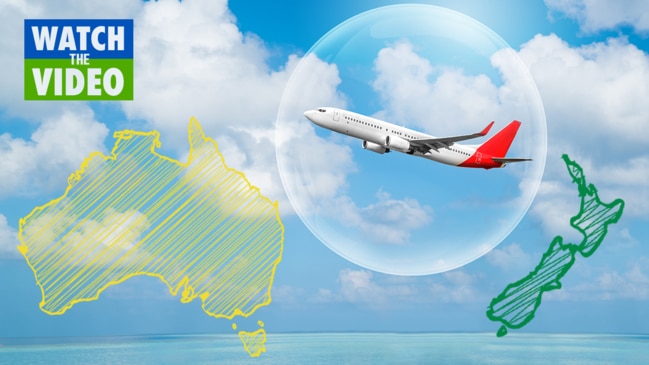
NSW Coronavirus News
Don't miss out on the headlines from NSW Coronavirus News. Followed categories will be added to My News.
Two doctors from a south west Sydney clinic have tested positive to COVID-19, raising fears of a cluster growing among vulnerable people in the area.
The two general practitioners worked at a medical clinic in Lakemba and are believed to have contracted the virus from a patient.
The doctors worked at A2Z Medical Clinic. Anyone who attended the practice on Thursday October 1 between 2pm and 2.30pm, Friday October 9 between 3pm-4.30pm and all day Saturday October 10 should be on alert.
The infected patient also attended Isra Medical Practice on Monday October 5 between 7.15pm and 7.40pm.
NSW Health Minister Brad Hazzard called on close contacts to get tested and self-isolate for two weeks regardless of any results.
“There may be a lot of people who have been through this facility,” he said.
“I stress, obviously as they are GPs in the practice, we expect there to be quite a number of people who may have been in close contact with them.”
There are also concerns the virus could have spread among people who caught trains from Wiley Park to Lakemba between October 1 and 6.
A known case also visited the Ingleburn Hotel from 3pm to 6pm on Sunday October 4.
It comes as six new cases of COVID-19 were recorded in NSW overnight, with just one case of local transmission.
NSW Health said the case was transmitted by a household contact which was reported yesterday. These cases are linked to two others which are still under investigation.
Five other cases were recorded in overseas travellers who remain in hotel quarantine.
However, authorities are concerned about a drop in testing numbers which they say hampers their ability to find people infected with the virus and contain its spread.
NSW Health is appealing to members of the community to come forward even if they have the mildest conditions.
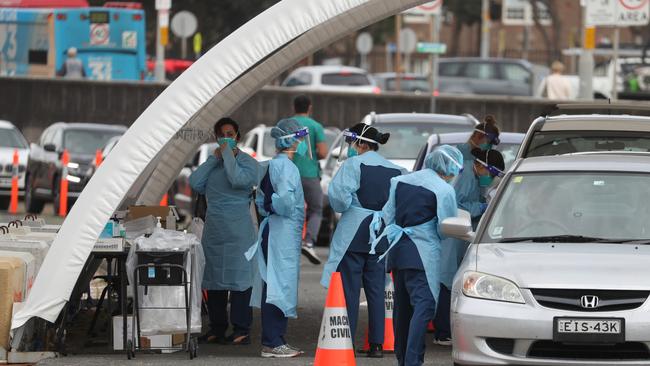
Dr McAnulty said low testing numbers were a “concern, as it limits our ability to find people with COVID-19 early and contain further spread”.
“NSW Health is appealing to the community to come forward for testing right away if you have even the mildest of symptoms – like a runny nose or scratchy throat, cough, fever or other symptoms that could be COVID-19,” he said.
“This is important throughout the state, and particularly the western and south western Sydney areas.”
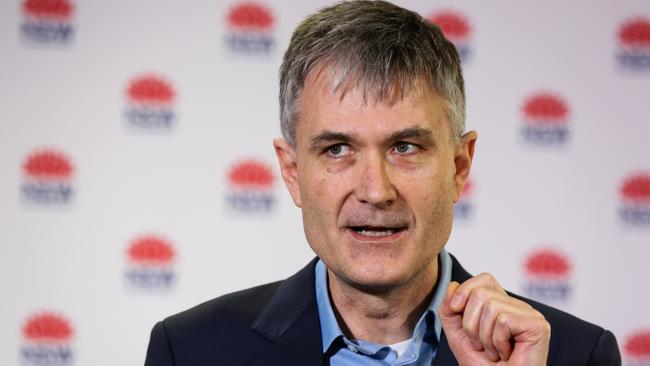
BIG W, BUNNINGS OUTLETS AMONG LATEST COVID CASES
Three new locally-acquired cases of COVID-19 were reported on Sunday, including a mystery case and a person who may have contracted the virus at a private Liverpool medical clinic.
The mystery case comes as a concern for authorities and – if it can’t be linked to a known cluster – poses a further risk that the Queensland border will not reopen when that state’s Chief Health Officer makes an assessment on border closures at the end of the month.
NSW health has also upgraded its previous warning for passengers on a train replacement bus from Central to Strathfield last week, forcing anyone who was on the service into two weeks isolation.
Anyone who travelled on the replacement bus leaving Central at 11.48pm on October 4 and arriving at Strathfield at 12.15am on October 5 must now isolate for 14 days. Previously the passengers were only considered ‘casual contacts’.
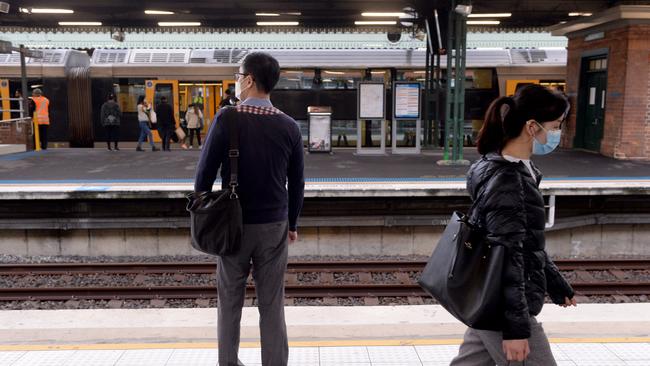
The mystery case reported today has sparked a warning for anyone who visited Lakemba Radiology from 12pm to 2.30pm on Thursday October 1.
Anyone at the facility at that time is now deemed a ‘casual contact’ and must monitor for symptoms.
A number of other warnings for venues in western and southwestern Sydney, with alerts for Carnes Hill Big W, Aldi Edmondson Park, the Casula Chemist Warehouse and Costco, and the Crossroads Bunnings.
Of the three new locally-acquired cases, two were linked with a known cluster.
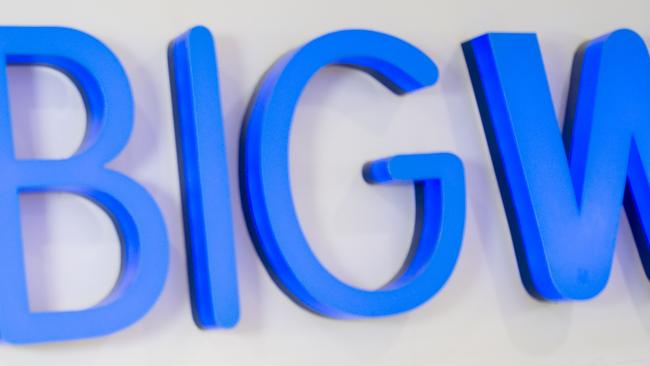
One case was linked with the Liverpool private health clinic cluster, testing positive after attending the facility at the same time as a previous case. There are now eight cases connected with the growing cluster.
The other local case with a known link is a social contact of a previously-reported mystery case.
Two cases in returned overseas travellers were also detected taking the total number of new cases to five.
Sunday’s cases were detected in 12,823 tests, compared with almost 15,500 the day before.
VIRUS CAN LAST FOR FOUR WEEKS ON SURFACES: STUDY
In research findings that will rock COVID-19 experts, the CSIRO has found the SARS-CoV-2 virus responsible for the disease can survive for up to 28 days on common surfaces including banknotes, glass such as that found on mobile phone screens and stainless steel.
The research replaces other studies which found the virus could at most last 3-7 days, and doubles the previously most dire prediction of up to 14 days.
Most shocking, and likely to accelerate the end of the cash economy, the study found the virus active on plastic Australian banknotes after 21 days, during which time they could circulate widely across the country and through hot spots like Melbourne.
The study, published in the international journal Virology, will today prompt warnings from the CSIRO to health experts and businesses, especially those dealing in large numbers of used bank notes.
Current SA Health advice states only that; “Studies suggest that the virus that causes COVID-19 may survive on surfaces for a few hours or in rarer cases up to several days”.
But the new study concludes: “These findings demonstrate SARS-CoV-2 can remain infectious for significantly longer time periods than generally considered possible”.
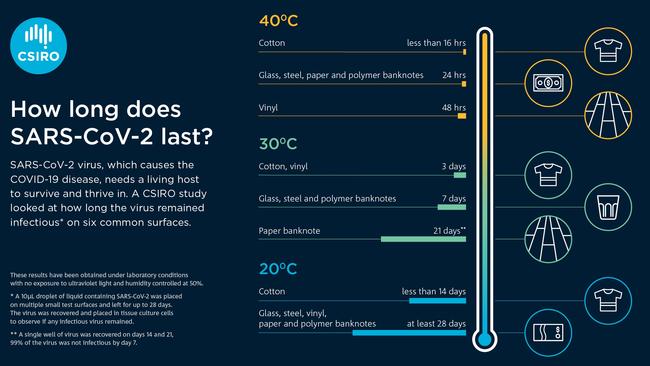
CSIRO Chief Executive Dr Larry Marshall said; “Establishing how long the virus really remains viable on surfaces enables us to more accurately predict and mitigate its spread, and do a better job of protecting our people’’.
“Together, we hope this suite of solutions from science will break down the barriers between us, and shift focus to dealing with specific virus hot spots so we can get the economy back on track,’’ he said.
The tests were carried out at the CSIRO Australian Centre for Disease Preparedness in Geelong and found the virus also; survived longer at lower temperatures, tended to survive longer on non-porous or smooth surfaces such as glass, stainless steel and vinyl, compared to porous complex surfaces such as cotton, and also survived longer on paper banknotes than plastic banknotes.
Deputy director of the centre Dr Debbie Eagles said the survival was for “long periods”, for example up to ten days longer than the flu virus.
“This reinforcing the need for good practices such as regular handwashing and cleaning surfaces,” she said.
“At 20 degrees Celsius, which is about room temperature, we found that the virus was extremely robust, surviving for 28 days on smooth surfaces such as glass found on mobile phone screens and plastic banknotes.
“For context, similar experiments for influenza A have found that it survived on surfaces for 17 days, which highlights just how resilient SARS-CoV-2 is.”
